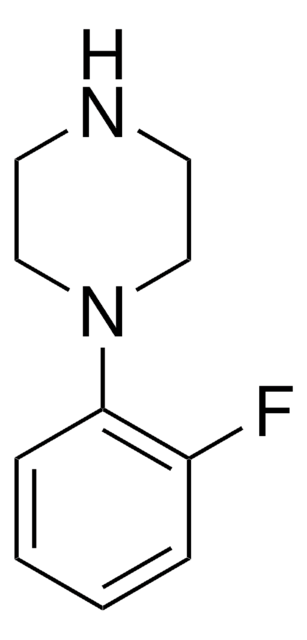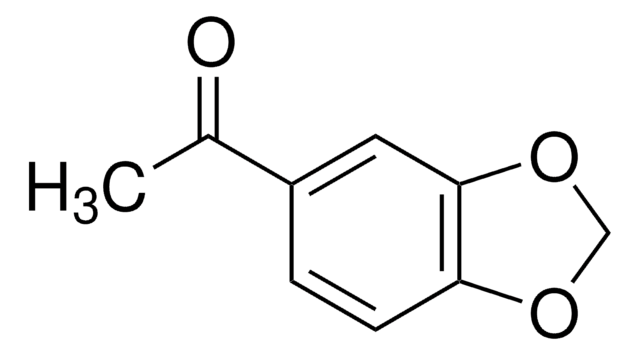All Photos(1)
About This Item
Empirical Formula (Hill Notation):
C12H16N2O2
CAS Number:
Molecular Weight:
220.27
EC Number:
MDL number:
UNSPSC Code:
12352100
PubChem Substance ID:
NACRES:
NA.22
Assay:
97%
Recommended Products
Quality Level
Assay
97%
bp
147-149 °C/2 mmHg (lit.)
mp
36-40 °C (lit.)
SMILES string
C1CN(CCN1)Cc2ccc3OCOc3c2
InChI
1S/C12H16N2O2/c1-2-11-12(16-9-15-11)7-10(1)8-14-5-3-13-4-6-14/h1-2,7,13H,3-6,8-9H2
InChI key
NBOOZXVYXHATOW-UHFFFAOYSA-N
General description
The effect of 1-piperonylpiperazine on 3,4-methylenedioxymethamphetamine (MDMA) induced neurotoxicity was studied.
Application
1-Piperonylpiperazine was used in the synthesis of acetyl-caffeic acid-1-piperonylpiperazine (HBU-47).
Signal Word
Warning
Hazard Statements
Precautionary Statements
Hazard Classifications
Eye Irrit. 2 - Skin Irrit. 2 - STOT SE 3
Target Organs
Respiratory system
Storage Class Code
11 - Combustible Solids
WGK
WGK 3
Flash Point(F)
235.4 °F - closed cup
Flash Point(C)
113 °C - closed cup
Personal Protective Equipment
dust mask type N95 (US), Eyeshields, Gloves
Choose from one of the most recent versions:
Already Own This Product?
Find documentation for the products that you have recently purchased in the Document Library.
Seon-Young Park et al.
International immunopharmacology, 19(1), 60-65 (2013-12-24)
In the present study, we synthesized a new hybrid compound by coupling caffeic acid and 1-piperonylpiperazine. The synthetic compound, acetyl-caffeic acid-1-piperonylpiperazine (HBU-47), showed potent anti-inflammatory effects inhibiting lipopolysaccharide (LPS)-induced production of nitric oxide (NO) in RAW264.7 macrophage cells. HBU-47 inhibited
K Hashimoto et al.
European journal of pharmacology, 228(2-3), 171-174 (1992-09-01)
The effects of 1-piperonylpiperazine and N,alpha-dimethylpiperonylamine, which are weak inhibitors for [3H]5-hydroxytryptamine (5-HT) uptake, on 3,4-methylenedioxymethamphetamine (MDMA)-induced neurotoxicity were examined. The reductions of serotonergic parameters in the rat cerebral cortex produced by multiple administration of MDMA (10 mg/kg) were attenuated
Lilian H J Richter et al.
Journal of pharmaceutical and biomedical analysis, 143, 32-42 (2017-06-12)
Metabolism studies play an important role in clinical and forensic toxicology. Because of potential species differences in metabolism, human samples are best suitable for elucidating metabolism. However, in the case of new psychoactive substances (NPS), human samples of controlled studies
K Hashimoto et al.
Brain research, 590(1-2), 341-344 (1992-09-11)
The neurotoxicity of 3,4-methylenedioxymethamphetamine (MDMA) in rat brain was attenuated significantly by coadministration of several benzylpiperazines (p-nitrobenzylpiperazine, p-chlorobenzylpiperazine and 1-piperonylpiperazine), which were weak inhibitors for [3H]6-nitroquipazine binding to the 5-hydroxytryptamine (5-HT) transporter in rat brain. These results suggest that these
Marcelo Dutra Arbo et al.
Archives of toxicology, 90(12), 3045-3060 (2016-01-29)
The piperazine derivatives most frequently consumed for recreational purposes are 1-benzylpiperazine, 1-(3,4-methylenedioxybenzyl) piperazine, 1-(3-trifluoromethylphenyl) piperazine and 1-(4-methoxyphenyl) piperazine. Generally, they are consumed as capsules, tablets or pills but also in powder or liquid forms. Currently, the precise mechanism by which
Our team of scientists has experience in all areas of research including Life Science, Material Science, Chemical Synthesis, Chromatography, Analytical and many others.
Contact Technical Service








